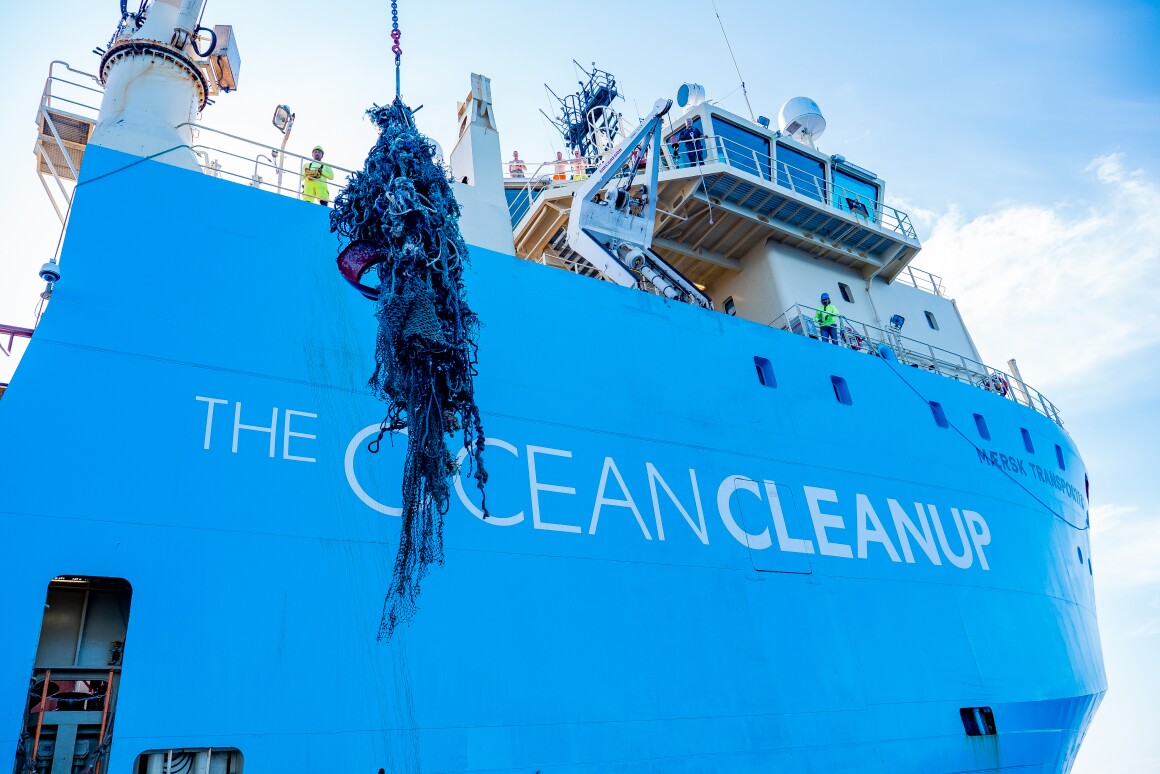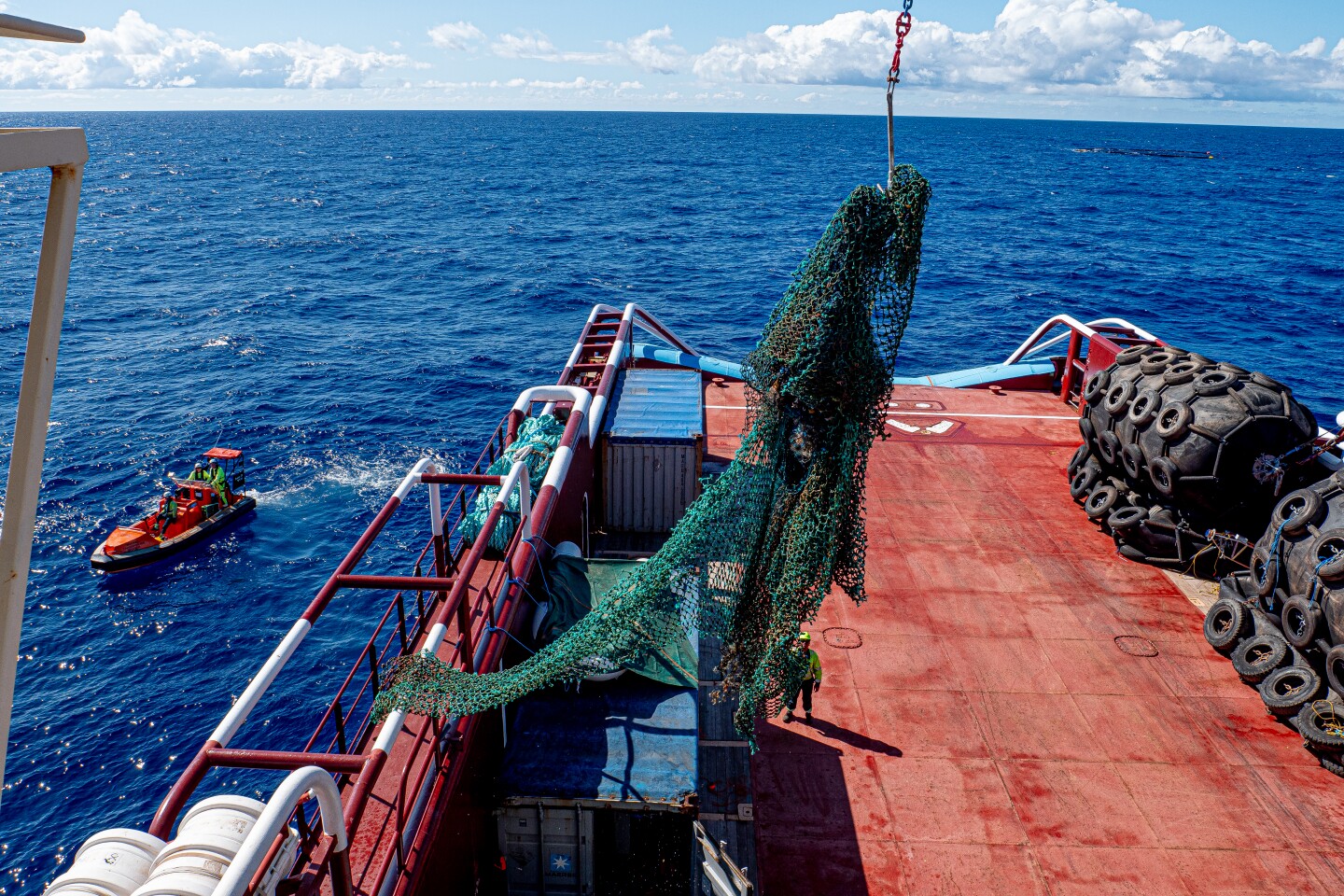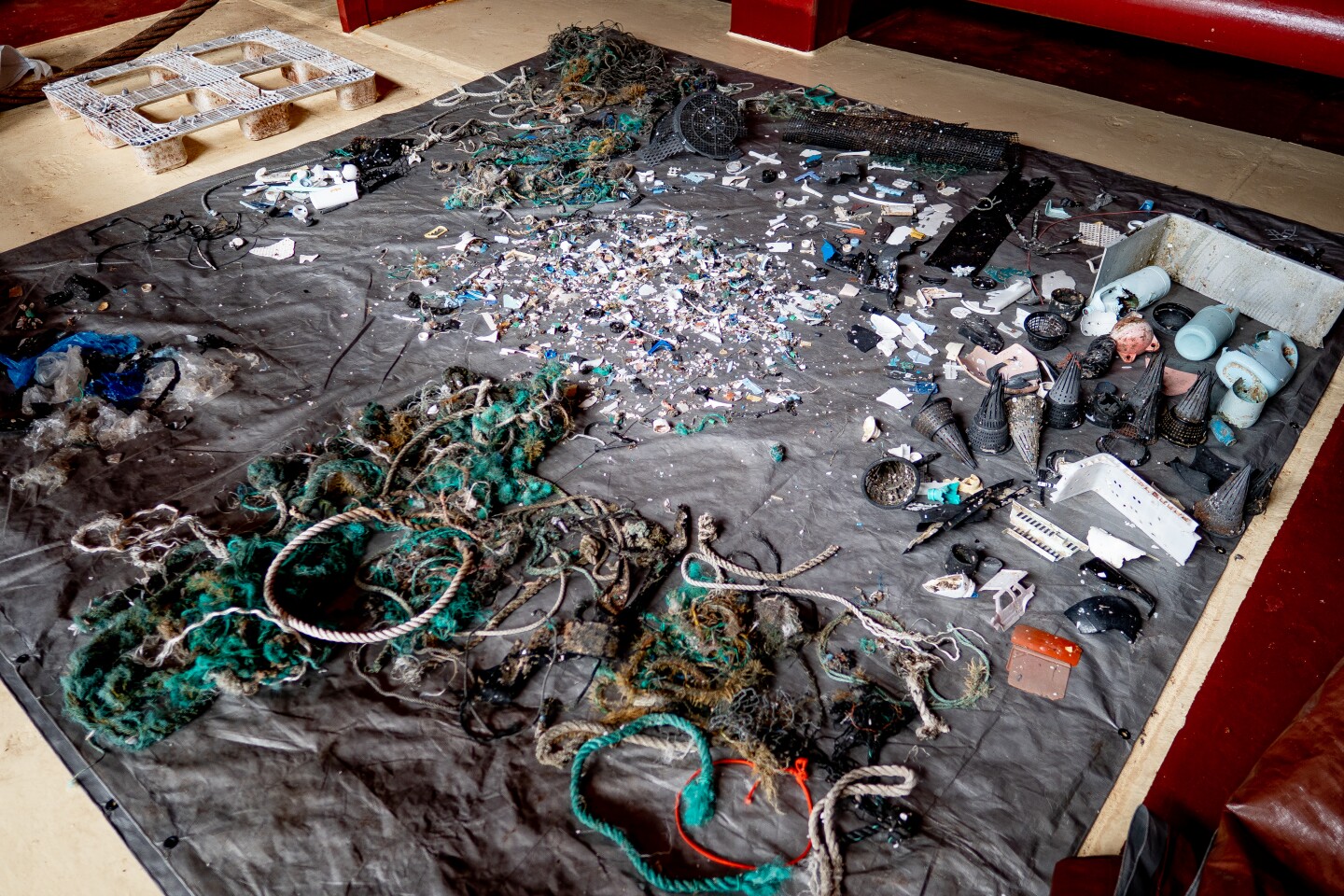Ocean Cleanup hauls first plastic trash back to shore

It hasn’t been entirely smooth sailing, but The Ocean Cleanup is now calling an end to a first successful mission to collect plastic from the Great Pacific Garbage Patch, today showing off the pile of trash on the shores of Vancouver.
The organization now plans to repurpose the recovered rubbish as plastic goods, with the profits to be funneled back into its cleanup operations, and preparations are already underway for its second-generation system.
The Ocean Cleanup first took to the Great Pacific Garbage Patch in October last year with the intention of collecting plastic waste with its huge floating booms. The system ruptured and had to be brought in for some repairs in January, before it was redesigned and redeployed mid-year. The team confirmed the barriers were successfully gathering trash in October.
The first proper foray into passive collection of ocean trash is now complete, with the team hauling the fruits of its labor back to base. The catch includes huge ghost nets and microplastics as small as a millimeter in size.
Recycling the plastic it recovered for use in plastic goods was always part of the team’s vision, and today it has expanded a little on these plans. It says this will be the first time that products will be made entirely out of ocean plastics, so the manufacturing process is likely to be tricky. In any case, if all goes relatively smoothly, it plans to use the trash to make “attractive, sustainable” products and begin selling them in September 2020.
“Welcoming the first catch of plastic on land is the moment we have been looking forward to for years,” says Ocean Cleanup CEO Boyan Slat. “I believe we can use this trash to turn a problem into a solution by transforming this unique material into a beautiful product. As most people will never go to the Great Pacific Garbage Patch, through these products, we aim to give everyone the opportunity to take part in the cleanup.”
The Ocean Cleanup says the profits from these products will be used to fund its ongoing cleanup operations. With this first mission a success, it is already working on building and deploying an even larger version of its trash-catching booms, System 002. This will be full-scale, able to collect more trash and hold it more securely.
Read more at newatlas.com
PRINCIPIA SCIENTIFIC INTERNATIONAL, legally registered in the UK as a company  incorporated for charitable purposes. Head Office: 27 Old Gloucester Street, London WC1N 3AX.
incorporated for charitable purposes. Head Office: 27 Old Gloucester Street, London WC1N 3AX.
Please DONATE TODAY To Help Our Non-Profit Mission To Defend The Scientific Method.
Trackback from your site.



Squidly
| #
What the hell is this? .. that’s it? .. I could have gathered that much just floating around on my inner tube .. what a joke! .. and they wonder why we don’t take them seriously about our pollution issues. They can spend hundreds of $billions on the
Global WarmingClimate Change fraud, but they can’t spend a penny on cleanup of actual pollution.Reply
Charles Higley
| #
Notice the complete lack of any quantitation. That says a lot.
Reply
Charles Higley
| #
Regular transits of the Pacific Garbage patch by ships out of Woods Hole, MA, has shown asymptotically declining refuse in the water. The advent of micro plastics is simply the main indicator that these things do break down over time. Nature always finds a way, to use a carbon source for life processes. It is not surprising that these guys reaped little harvest. The last Woods Hole transit had to seine for extended times to get enough refuse to do any statistics.
Reply
Moffin
| #
A really efficient alternative to seining is called “beach cast”. Beaches are relatively common and are usually longer than the length of the whole country they are contiguous to.
“Beach combers” are the necessary component along with appropriate wast reception.
Look for areas with prevailing onshore winds.
There could be a beach near you and, yep, prevention is better than cure.
Reply
Finn McCool
| #
On their website they show around 20 1 tonne big bags of recovered plastic. Given the voids in the bags and the low density of the material, I would estimate about about 2 tonnes at the very very most.
Reply
Andy Rowlands
| #
An excellent idea in principle, but they need to vastly scale it up to have any effect.
Reply
Melanie White
| #
jkljkjkln jkljklj kljkljklh hjkh hjkh klj kkl hjh
Reply
steve Parker
| #
I wondered where that bit of rope went to.
Reply
Carbon Bigfoot
| #
The economics of recycling and making useful products and profits from this crap is fairy dust and unicorns.
Reply
James McGinn
| #
Why are they bringing it back? They should burn it so that the life giving substance, CO2, is released into the atmosphere where it will benefit plants, animals, and mankind.
Reply
J.D.
| #
A large plastic incinerator ship should be tried, even while the problem of drying the plastic and the large amount of fuel necessary to burn such wet junk will be significant. It could stand on-station in the Pacific over many months, acting like a baleen whale to scoop up junk stuff and spread on a fore-deck, which is then drained off and routed into a flash-drier and incinerator section. It could fuel steam-powered engines, saving fuel. Then after the burning, to discarding overboard a bucket of burnt-down clinkers from the indinerator, which will sink. Sounds much better than having a floating garbage patch in the middle of the Pacific, or trying to drag it all ashore thousands of miles away. Of course, that’s too politically incorrect. We are now building a similar problem in outer space with all the space junk. The cost of retrevial in both cases is much higher than the cost of limiting the junk, but needs doing in some manner.
Reply
JaKo
| #
Why burning it? You could easily pre-process it (compressing / melting) much cheaper and then sell it to, well, garbage/recycling processors on land…
Reply
Squidly
| #
Recycling plastics is more costly in both material and energy than to produce from scratch. Recycling almost anything other than metals is seriously stupid. The only thing that keeps recycling operations alive are government subsidies. Countless taxpayer resources has been thoroughly wasted through “recycling” over the decades. All forms of subsidy should be stopped immediately .. and you will see recycling operations cease immediately too, as they cannot exist without it.
Reply
Pierre D. Bernier
| #
WOW !!! It’s junk allright !
Reply